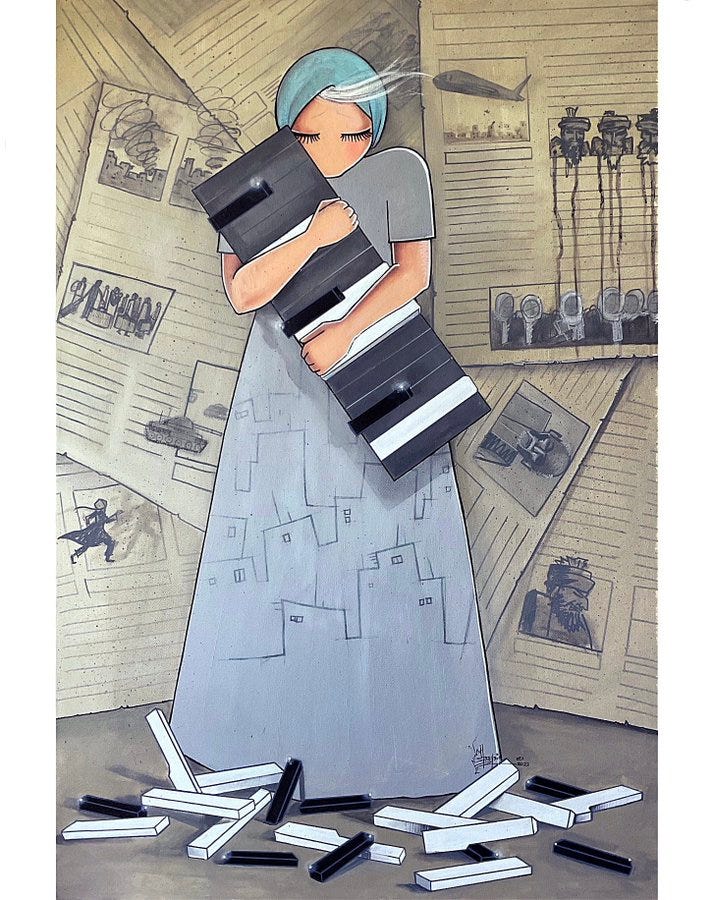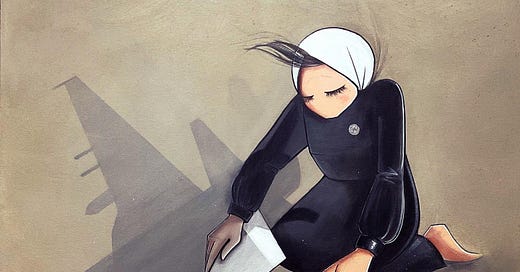A year since the fall of Kabul, what Afghanistan’s former women politicians are saying, and other stories
#WomenLead (Issue 111): Your weekly round-up on women in politics
Hello, and welcome to Issue 111!
It’s the best of times, and yet the worst of times here in South Asia - for Pakistan and India, today and tomorrow respectively, mark 75 years of independence from British colonial rule. This milestone year is being celebrated with zest and fervor and a high dose of patriotism.
But not too far from both countries, it is a time of gloom as Afghanistan marks a year since the return of Taliban rule, a year that has seen dignity, rights and freedoms snatched away from Afghan people, and especially from the country’s girls and women.
In today’s edition, the spotlight is on Afghanistan, as seen from the eyes of some of its former women politicians, and we bring you quick updates from Japan, Kenya and Papua New Guinea. In case you missed last week’s edition, you can read it here.
Quick Updates
🙋♀️ ONLY WOMAN IN THE HOUSE: In Papua New Guinea, Rufina Peter has been elected as MP, and she will become the only woman member of the House. She’s just the eighth woman in the country’s history to be elected as a Parliamentarian.
Read more: Shouldering the weight of four million women: PNG elects its first female MP in a decade, The Guardian
🐌 A SLOW MARCH FORWARD: In Kenya, election results are still being counted but early counting suggests that the country has made progress on the representation front. Early results suggest at least seven women governors have been elected as compared to three in the previous election. The total number of governors is 47, so while there has been progress, there’s a long walk ahead.
🤰TO BE AMUSED OR IMPRESSED? Last month, Seiko Noda, Japan’s former minister for gender equality and children, made a scathing observation - that the “indifference and ignorance” of Japan’s male-dominated Parliament was to blame for the national crisis of the country’s plunging population. Noda was replaced by Masanobu Ogura when PM Fumio Kishida shuffled his cabinet earlier this month (with only two women #nosurprises). Mr. Ogura seems to have taken his role quite seriously, even before he took over the position.
In April 2021, he tried a “pregnancy belly” - weighing 7.3 kg - as he tried various routine tasks such as part of a project organized by the youth wing of the ruling party. PM Kishida told a press conference that Ogura would bring a “young and fresh perspective” to address the problem of a declining population.
We don’t know what to say. Call Ogura sporty and brave for walking around with the pregnant belly? We’d rather be asking - why is it easier to get men to experience lives as women versus just bringing in more women into your cabinet and Parliament, Mr. Kishido? *sigh*


Spotlight: AFGHANISTAN 🇦🇫🇦🇫🇦🇫
A little over a year ago, 67 women were elected as MPs in Afghanistan, making up over a quarter (27 percent) of the Parliament. That share put the country on the 74th rank on the Inter-Parliamentary Union’s global rankings on women in Parliament, ahead of many of its regional peers (as of July 01, 2021).
But just days later, their world shifted.
The Taliban were back in power - rather swiftly - as disinterested US forces left the country hastily, caring little to protect those in whose name they had been around for years.
In a matter of weeks, the country’s social, political, economic, and cultural landscape changed. By August 15, 2021, the President had fled and the Taliban's takeover was complete.
The country’s politics and public life no longer had space for its women.

It’s been a year, and reports from the country only offer reasons to feel angry and dismayed. Our thoughts are with the people of Afghanistan, and especially the girls and women who have been denied basic freedoms and rights to an extent that should put the entire global community to shame.
And yet, they are trying to hold fort, raise issues impacting their country, and take to the streets to protest amidst grave risks to their own lives.
As we mark a year since Taliban’s takeover of Afghanistan, we turn to what former women political leaders of the country are saying:
“This time last year I thought we could still reach peace. As a member of the peace talks delegation of the former Afghan Republic, my colleagues and I were hopeful for a settlement. After all, we naively believed in the narrative that was created for us. We were told that the ‘Taliban 2.0’ is a changed group. Our international colleagues who had met Taliban leaders in Doha reassured us that the militant group’s ideology on women’s rights had evolved.
Taliban leaders were also quick to seize newfound fame, repeating the narrative that they had changed their position on all issues, especially women’s rights. They even approached the four female members of our delegation to convince us. A senior Taliban negotiator reiterated to me in person that a ‘Taliban 2.0’ regime would allow women to hold high political offices, including the office of prime minister.
To convince the world, other senior Taliban figures, including the leader of the Haqqani Network, a particularly conservative element within the organization, even went as far as publishing an op-ed in The New York Times, spewing words of hope for the formation of ‘an inclusive political system in which the voice of every Afghan is reflected and where no Afghan feels excluded’.”
~ Fawzia Koofi, in her article titled ‘Is the world becoming too naive in its approach to the Taliban?’ in The National. Koofi is a former Deputy Speaker of Afghanistan’s Parliament, and was also a member of the delegation negotiating peace with the Taliban

“The international community - the US and NATO - made a mistake in Afghanistan. Without any plan they withdrew from Afghanistan and left it in the hands of the Taliban. Now, they have to fix it - it is their responsibility, it is a global responsibility. Afghans are human beings - we deserve to have a better life.
It’s been more than forty years that we have been suffering from war and conflict. Every day is bloodshed in Afghanistan. The international community should take responsibility for Afghan people, and particularly Afghan women.”
~ Habiba Sarabi, speaking to France 24. Sarabi is a former Afghan minister for women's affairs and former governor of Bamiyan province. She was also a member of the delegation negotiating peace with the Taliban

“When I talk to women and girls in Afghanistan today, they say they feel that they are trapped in a cage of four walls, the walls of the house. They feel that they are being treated like animals in a zoo. There’s a real sense of attack on their dignity.
These young women once had a lot of ambitions. Suddenly, they feel their life is over. The only path for them is to get married and have children, not to pursue an education or be able to have an income. And that's not a future that they want. Not everyone can afford to leave Afghanistan.”
~ Shaharzad Akbar, speaking to The National. Akbar is former chairperson of Afghanistan’s Independent Human Rights Commission
“I left Afghanistan one week before Kabul fell, with my children. They said, Herat, my city, would be surrendered to the Taliban. I left behind the house where I fell in love with my husband and had children. I was a public representative for 12 years… I knew every part of the city, its problems, its strengths. I had my staff, my constituents, and people who helped me. I left all that behind, taking only clothes, my phone and diapers for the baby. As I left, I thought, am I going to see my city, my home again?
…Women’s rights are human rights. If women are not part of decision-making processes, if they are not part of the political space, all the achievements we made would vanish.
We had reserved seats for women in the electoral law, we established six months of maternity leave for women in the labor law, we passed the citizenship law that allows women to pass on citizenship to their children. We made it mandatory that mothers’ names would be on birth certificates. Women parliamentarians made a lot of difference. When the law on ending violence against women was lacking implementation, we asked, why, and persisted.
After 20 years of so many insecurities and impediments, Afghan women became ministers, women’s rights activists, pilots, athletes and led robotic teams. The women of Afghanistan are a source of pride for the country. And we had to fight for whatever we have today. When you gain something, you don’t give it up. We will fight for this… you will see.”
~ Naheed Farid, ‘From where I stand: “If women are not part of decision-making processes… all the achievements we made would vanish”’ UN Women. Farid was a member of Afghanistan’s Parliament
Also read: ‘Afghan Women’ Aren’t Who You Think They Are: Foreign Policy and Far from home: Time Magazine
Reflections & Reads
“‘The world is my oyster’: Nicola Sturgeon on feminism, her last push for independence and life after politics,” The Guardian
“How it’s getting harder for women to run for president in the US,” Politico
“Change happens when women become president: The new book and AI tool showing how,” Women’s Agenda
That’s a wrap for this week! Liked this edition? Then press the ❤️ button and show us some love! And please, please do share this with a friend or on your social media accounts. There’s frankly nothing quite like reader love and endorsement, so please keep it coming! We’ll see you next weekend with Issue 112!




